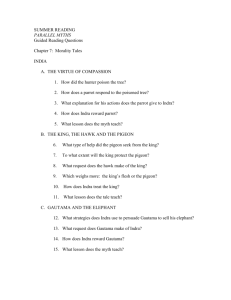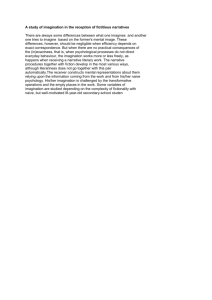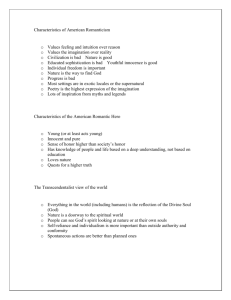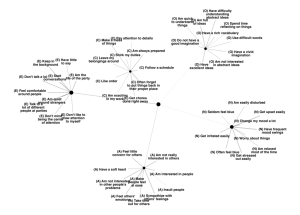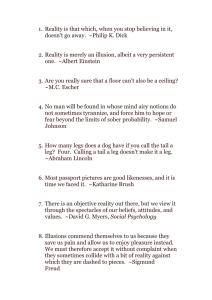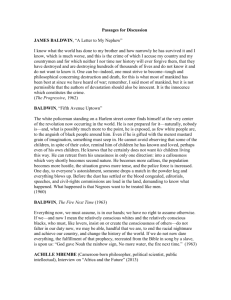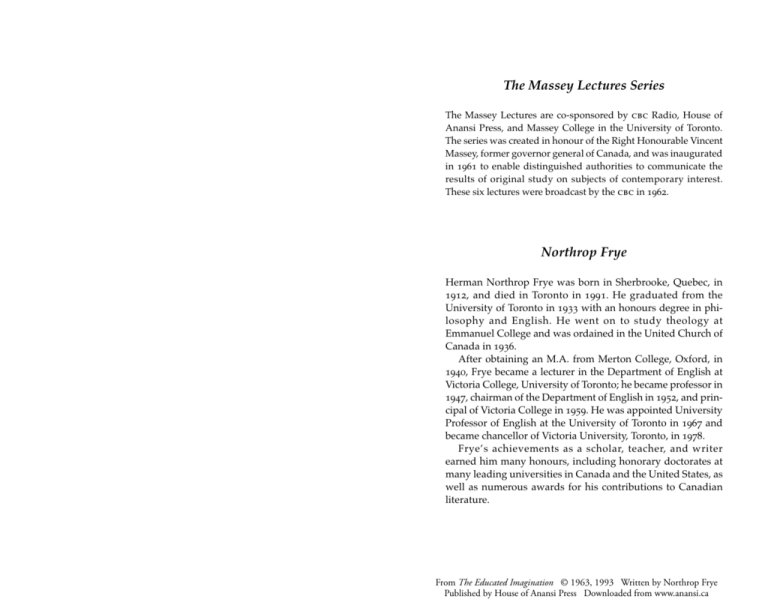
The Massey Lectures Series
The Massey Lectures are co-sponsored by cbc Radio, House of
Anansi Press, and Massey College in the University of Toronto.
The series was created in honour of the Right Honourable Vincent
Massey, former governor general of Canada, and was inaugurated
in 1961 to enable distinguished authorities to communicate the
results of original study on subjects of contemporary interest.
These six lectures were broadcast by the cbc in 1962.
Northrop Frye
Herman Northrop Frye was born in Sherbrooke, Quebec, in
1912, and died in Toronto in 1991. He graduated from the
University of Toronto in 1933 with an honours degree in philosophy and English. He went on to study theology at
Emmanuel College and was ordained in the United Church of
Canada in 1936.
After obtaining an M.A. from Merton College, Oxford, in
1940, Frye became a lecturer in the Department of English at
Victoria College, University of Toronto; he became professor in
1947, chairman of the Department of English in 1952, and principal of Victoria College in 1959. He was appointed University
Professor of English at the University of Toronto in 1967 and
became chancellor of Victoria University, Toronto, in 1978.
Frye’s achievements as a scholar, teacher, and writer
earned him many honours, including honorary doctorates at
many leading universities in Canada and the United States, as
well as numerous awards for his contributions to Canadian
literature.
From The Educated Imagination © 1963, 1993 Written by Northrop Frye
Published by House of Anansi Press Downloaded from www.anansi.ca
Also by Northrop Frye
Fearful Symmetry: A Study of William Blake
Anatomy of Criticism
The Well-Tempered Critic
THE EDUCATED IMAGINATION
NORTHROP FRYE
T. S. Eliot
Fables of Identity
A Natural Perspective
The Return of Eden
Fools of Ti m e
The Modern Century
A Study of English Romanticism
The Stubborn Structure
The Bush Garden
The Critical Path
The Secular Scripture
Spiritus Mundi
Northrop Frye on Culture and Literature
Creation and Recreation
The Great Code
Divisions on a Ground
The Myth of Deliverance
From The Educated Imagination © 1963, 1993 Written by Northrop Frye
Published by House of Anansi Press Downloaded from www.anansi.ca
From The Educated Imagination © 1963, 1993 Written by Northrop Frye
Published by House of Anansi Press Downloaded from www.anansi.ca
Copyright © 1963 Northrop Frye and the Canadian Broadcasting Corporation
All rights reserved. No part of this publication may be reproduced or transmitted in
any form or by any means, electronic or mechanical, including photocopying,
recording, or any information storage and retrieval system, without permission in
writing from the publisher.
Contents
First published in 1963 by cbc Enterprises
Published in 1993 by House of Anansi Press Ltd.
Distributed in Canada by
HarperCollins Canada Ltd.
1995 Markham Road
Scarborough, on, m1b 5m8
Toll free tel. 1-800-387-0117
This edition published in 2002 by
House of Anansi Press Inc.
110 Spadina Avenue, Suite 801
Toronto, on, m5v 2k4
Tel. 416-363-4343
Fax 416-363-1017
www.anansi.ca
cbc and Massey College logos used with permission
House of Anansi Press is committed to protecting our natural environment. As part
of our efforts, this book is printed on paper that contains 100%
post-consumer recycled fibres, is acid-free, and is processed chlorine-free.
13 12 11 10 09
10 11 12 13 14
library and archives canada cataloguing in publication data
Frye, Northrop, 1912–1991
The educated imagination
i
ii
iii
iv
v
vi
The Motive for Metaphor
The Singing School
Giants in Time
1
17
33
The Keys to Dreamland
Verticals of Adam
49
65
The Vocation of Eloquence
Acknowledgements
81
99
(cbc Massey lectures series; 1962)
Text of 6 radio lectures broadcast in fall 1962.
ISBN 978-0-88784-598-7
1. Literature — Philosophy. 2. Literature — Study and teaching. I. Title. II. Series.
PN45.F7 1998
801
C93-094487-9
Cover design and photography: Bill Douglas at The Bang
Typesetting: Brian Panhuyzen
We acknowledge for their financial support of our publishing program the
Canada Council for the Arts, the Ontario Arts Council, and the
Government of Canada through the Canada Book Fund.
Printed and bound in Canada
From The Educated Imagination © 1963, 1993 Written by Northrop Frye
Published by House of Anansi Press Downloaded from www.anansi.ca
From The Educated Imagination © 1963, 1993 Written by Northrop Frye
Published by House of Anansi Press Downloaded from www.anansi.ca
THE EDUCATED IMAGINATION
From The Educated Imagination © 1963, 1993 Written by Northrop Frye
Published by House of Anansi Press Downloaded from www.anansi.ca
From The Educated Imagination © 1963, 1993 Written by Northrop Frye
Published by House of Anansi Press Downloaded from www.anansi.ca
I
THE MOTIVE FOR
M E TA P H O R
F o r t h e pa s t t w e n t y - f i v e years I have been teaching and studying English literature in a university. As in
any other job, certain questions stick in one’s mind, not
because people keep asking them, but because they’re the
questions inspired by the very fact of being in such a
place. What good is the study of literature? Does it help
us to think more clearly, or feel more sensitively, or live a
better life than we could without it? What is the function
of the teacher and scholar, or of the person who calls himself, as I do, a literary critic? What difference does the
study of literature make in our social or political or religious attitude? In my early days I thought very little
about such questions, not because I had any of the
answers, but because I assumed that anybody who asked
them was naïve. I think now that the simplest questions
are not only the hardest to answer, but the most important to ask, so I’m going to raise them and try to suggest
From The Educated Imagination © 1963, 1993 Written by Northrop Frye
Published by House of Anansi Press Downloaded from www.anansi.ca
From The Educated Imagination © 1963, 1993 Written by Northrop Frye
Published by House of Anansi Press Downloaded from www.anansi.ca
2
the educated imagination
what my present answers are. I say try to suggest,
because there are only more or less inadequate answers to
such questions — there aren’t any right answers. The
kind of problem that literature raises is not the kind that
you ever “solve.” Whether my answers are any good or
not, they represent a fair amount of thinking about the
questions. As I can’t see my audience, I have to choose my
rhetorical style in the dark, and I’m taking the classroom
style, because an audience of students is the one I feel easiest with.
There are two things in particular that I want to discuss with you. In school, and in university, there’s a
subject called “English” in English-speaking countries.
English means, in the first place, the mother tongue. As
that, it’s the most practical subject in the world: you can’t
understand anything or take any part in your society
without it. Wherever illiteracy is a problem, it’s as fundamental a problem as getting enough to eat or a place to
sleep. The native language takes precedence over every
other subject of study: nothing else can compare with it in
usefulness. But then you find that every mother tongue,
in any developed or civilized society, turns into something called literature. If you keep on studying “English,”
you find yourself trying to read Shakespeare and Milton.
Literature, we’re told, is one of the arts, along with
painting and music, and, after you’ve looked up all the
hard words and the Classical allusions and learned what
words like imagery and diction are supposed to mean,
what you use in understanding it, or so you’re told, is
your imagination. Here you don’t seem to be in quite the
From The Educated Imagination © 1963, 1993 Written by Northrop Frye
Published by House of Anansi Press Downloaded from www.anansi.ca
The Motive for Metaphor
3
same practical and useful area: Shakespeare and Milton,
whatever their merits, are not the kind of thing you
must know to hold any place in society at all. A person
who knows nothing about literature may be an ignoramus, but many people don’t mind being that. Every child
realizes that literature is taking him in a different direction
from the immediately useful, and a good many children
complain loudly about this. Two questions I want to deal
with, then, are, first: what is the relation of English as the
mother tongue to English as a literature? Second: what is
the social value of the study of literature, and what is the
place of the imagination that literature addresses itself to,
in the learning process?
Let’s start with the different ways there are of dealing
with the world we’re living in. Suppose you’re shipwrecked on an uninhabited island in the South Seas. The
first thing you do is to take a long look at the world
around you, a world of sky and sea and earth and stars
and trees and hills. You see this world as objective, as
something set over against you and not yourself or
related to you in any way. And you notice two things
about this objective world. In the first place, it doesn’t
have any conversation. It’s full of animals and plants and
insects going on with their own business, but there’s
nothing that responds to you: it has no morals and no
intelligence, or at least none that you can grasp. It may
have a shape and a meaning, but it doesn’t seem to be a
human shape or a human meaning. Even if there’s
enough to eat and no dangerous animals, you feel lonely
and frightened and unwanted in such a world.
From The Educated Imagination © 1963, 1993 Written by Northrop Frye
Published by House of Anansi Press Downloaded from www.anansi.ca
4
the educated imagination
In the second place, you find that looking at the world,
as something set over against you, splits your mind in
two. You have an intellect that feels curious about it and
wants to study it, and you have feelings or emotions
that see it as beautiful or austere or terrible. You know that
both these attitudes have some reality, at least for you. If
the ship you were wrecked in was a Western ship, you’d
probably feel that your intellect tells you more about
what’s really there in the outer world, and that your emotions tell you more about what’s going on inside you. If
your background were Oriental, you’d be more likely to
reverse this and say that the beauty or terror was what
was really there, and that your instinct to count and classify and measure and pull to pieces was what was inside
your mind. But whether your point of view is Western or
Eastern, intellect and emotion never get together in your
mind as long as you’re simply looking at the world. They
alternate, and keep you divided between them.
The language you use on this level of the mind is the
language of consciousness or awareness. It’s largely a language of nouns and adjectives. You have to have names
for things, and you need qualities like “wet” or “green”
or “beautiful” to describe how things seem to you. This is
the speculative or contemplative position of the mind, the
position in which the arts and sciences begin, although
they don’t stay there very long. The sciences begin by
accepting the facts and the evidence about an outside
world without trying to alter them. Science proceeds by
accurate measurement and description, and follows the
demands of the reason rather than the emotions. What it
From The Educated Imagination © 1963, 1993 Written by Northrop Frye
Published by House of Anansi Press Downloaded from www.anansi.ca
The Motive for Metaphor
5
deals with is there, whether we like it or not. The emotions are unreasonable: for them it’s what they like and
don’t like that comes first. We’d be naturally inclined to
think that the arts follow the path of emotion, in contrast
to the sciences. Up to a point they do, but there’s a complicating factor.
That complicating factor is the contrast between “I like
this” and “I don’t like this.” In this Robinson Crusoe life
I’ve assigned you, you may have moods of complete
peacefulness and joy, moods when you accept your island
and everything around you. You wouldn’t have such
moods very often, and when you had them, they’d
be moods of identification, when you felt that the island
was a part of you and you a part of it. That is not the feeling of consciousness or awareness, where you feel split
off from everything that’s not your perceiving self. Your
habitual state of mind is the feeling of separation which
goes with being conscious, and the feeling “this is not a
part of me” soon becomes “this is not what I want.”
Notice the word “want”: we’ll be coming back to it.
So you soon realize that there’s a difference between
the world you’re living in and the world you want to live
in. The world you want to live in is a human world, not
an objective one: it’s not an environment but a home; it’s
not the world you see but the world you build out of
what you see. You go to work to build a shelter or plant a
garden, and as soon as you start to work you’ve moved
into a different level of human life. You’re not separating
only yourself from nature now, but constructing a human
world and separating it from the rest of the world. Your
From The Educated Imagination © 1963, 1993 Written by Northrop Frye
Published by House of Anansi Press Downloaded from www.anansi.ca
6
the educated imagination
intellect and emotions are now both engaged in the same
activity, so there’s no longer any real distinction between
them. As soon as you plant a garden or a crop, you
develop the conception of a “weed,” the plant you don’t
want in there. But you can’t say that “weed” is either an
intellectual or an emotional conception, because it’s both
at once. Further, you go to work because you feel you
have to, and because you want something at the end of
the work. That means that the important categories
of your life are no longer the subject and the object, the
watcher and the things being watched: the important categories are what you have to do and what you want to do
— in other words, necessity and freedom.
One person by himself is not a complete human
being, so I’ll provide you with another shipwrecked
refugee of the opposite sex and an eventual family. Now
you’re a member of a human society. This human society
after a while will transform the island into something
with a human shape. What that human shape is, is
revealed in the shape of the work you do: the buildings,
such as they are, the paths through the woods, the
planted crops fenced off against whatever animals want
to eat them. These things, these rudiments of city, highway, garden and farm, are the human form of nature,
or the form of human nature, whichever you like. This is
the area of the applied arts and sciences, and it appears
in our society as engineering and agriculture and medicine and architecture. In this area we can never say
clearly where the art stops and the science begins, or
vice versa.
From The Educated Imagination © 1963, 1993 Written by Northrop Frye
Published by House of Anansi Press Downloaded from www.anansi.ca
The Motive for Metaphor
7
The language you use on this level is the language of
practical sense, a language of verbs or words of action
and movement. The practical world, however, is a world
where actions speak louder than words. In some ways it’s
a higher level of existence than the speculative level,
because it’s doing something about the world instead of
just looking at it, but in itself it’s a much more primitive
level. It’s the process of adapting to the environment, or
rather of transforming the environment in the interests of
one species, that goes on among animals and plants as
well as human beings. The animals have a good many of
our practical skills: some insects make pretty fair architects, and beavers know quite a lot about engineering. In
this island, probably, and certainly if you were alone,
you’d have about the ranking of a second-rate animal.
What makes our practical life really human is a third level
of the mind, a level where consciousness and practical
skill come together.
This third level is a vision or model in your mind of
what you want to construct. There’s that word “want”
again. The actions of man are prompted by desire, and
some of these desires are needs, like food and warmth
and shelter. One of these needs is sexual, the desire to
reproduce and bring more human beings into existence.
But there’s also a desire to bring a social human form into
existence: the form of cities and gardens and farms that
we call civilization. Many animals and insects have this
social form too, but man knows that he has it: he can compare what he does with what he can imagine being done.
So we begin to see where the imagination belongs in the
From The Educated Imagination © 1963, 1993 Written by Northrop Frye
Published by House of Anansi Press Downloaded from www.anansi.ca
8
the educated imagination
scheme of human affairs. It’s the power of constructing
possible models of human experience. In the world of the
imagination, anything goes that’s imaginatively possible,
but nothing really happens. If it did happen, it would
move out of the world of imagination into the world
of action.
We have three levels of the mind now, and a language
for each of them, which in English-speaking societies
means an English for each of them. There’s the level of
consciousness and awareness, where the most important
thing is the difference between me and everything else.
The English of this level is the English of ordinary conversation, which is mostly monologue, as you’ll soon
realize if you do a bit of eavesdropping, or listening to
yourself. We can call it the language of self-expression.
Then there’s the level of social participation, the working
or technological language of teachers and preachers and
politicians and advertisers and lawyers and journalists
and scientists. We’ve already called this the language of
practical sense. Then there’s the level of imagination,
which produces the literary language of poems and plays
and novels. They’re not really different languages, of
course, but three different reasons for using words.
On this basis, perhaps, we can distinguish the arts
from the sciences. Science begins with the world we have
to live in, accepting its data and trying to explain its laws.
From there, it moves towards the imagination: it becomes
a mental construct, a model of a possible way of interpreting experience. The further it goes in this direction,
the more it tends to speak the language of mathematics,
From The Educated Imagination © 1963, 1993 Written by Northrop Frye
Published by House of Anansi Press Downloaded from www.anansi.ca
The Motive for Metaphor
9
which is really one of the languages of the imagination,
along with literature and music. Art, on the other hand,
begins with the world we construct, not with the world
we see. It starts with the imagination, and then works
towards ordinary experience: that is, it tries to make itself
as convincing and recognizable as it can. You can see why
we tend to think of the sciences as intellectual and the arts
as emotional: one starts with the world as it is, the other
with the world we want to have. Up to a point it is true
that science gives an intellectual view of reality, and that
the arts try to make the emotions as precise and disciplined as sciences do the intellect. But of course it’s
nonsense to think of the scientist as a cold unemotional
reasoner and the artist as somebody who’s in a perpetual
emotional tizzy. You can’t distinguish the arts from the
sciences by the mental processes the people in them use:
they both operate on a mixture of hunch and common
sense. A highly developed science and a highly developed art are very close together, psychologically and
otherwise.
Still, the fact that they start from opposite ends, even if
they do meet in the middle, makes for one important difference between them. Science learns more and more
about the world as it goes on: it evolves and improves. A
physicist today knows more physics than Newton did,
even if he’s not as great a scientist. But literature begins
with the possible model of experience, and what it produces is the literary model we call the classic. Literature
doesn’t evolve or improve or progress. We may have
dramatists in the future who will write plays as good as
From The Educated Imagination © 1963, 1993 Written by Northrop Frye
Published by House of Anansi Press Downloaded from www.anansi.ca
10
the educated imagination
King Lear, though they’ll be very different ones, but
drama as a whole will never get better than King Lear.
King Lear is it, as far as drama is concerned; so is Oedipus
Rex, written two thousand years earlier than that, and
both will be models of dramatic writing as long as the
human race endures. Social conditions may improve:
most of us would rather live in nineteenth-century
United States than in thirteenth-century Italy, and for
most of us Whitman’s celebration of democracy makes a
lot more sense than Dante’s Inferno. But it doesn’t follow
that Whitman is a better poet than Dante: literature won’t
line up with that kind of improvement.
So we find that everything that does improve, including science, leaves the literary artist out in the cold.
Writers don’t seem to benefit much by the advance of science, although they thrive on superstitions of all kinds.
And you certainly wouldn’t turn to contemporary poets
for guidance or leadership in the twentieth-century
world. You’d hardly go to Ezra Pound, with his fascism
and social credit and Confucianism and anti-Semitism.
Or to Yeats, with his spiritualism and fairies and astrology. Or to D. H. Lawrence, who’ll tell you that it’s a good
thing for servants to be flogged because that restores the
precious current of blood-reciprocity between servant
and master. Or to T. S. Eliot, who’ll tell you that to have a
flourishing culture we should educate an élite, keep most
people living in the same spot, and never disestablish the
Church of England. The novelists seem to be a little closer
to the world they’re living in, but not much. When
Communists talk about the decadence of bourgeois culFrom The Educated Imagination © 1963, 1993 Written by Northrop Frye
Published by House of Anansi Press Downloaded from www.anansi.ca
The Motive for Metaphor
11
ture, this is the kind of thing they always bring up. Their
own writers don’t seem to be any better, though; just
duller. So the real question is a bigger one. Is it possible
that literature, especially poetry, is something that a scientific civilization like ours will eventually outgrow?
Man has always wanted to fly, and thousands of years
ago he was making sculptures of winged bulls and telling
stories about people who flew so high on artificial wings
that the sun melted them off. In an Indian play fifteen
hundred years old, Sakuntala, there’s a god who flies
around in a chariot that to a modern reader sounds very
much like a private aeroplane. Interesting that the writer
had so much imagination, but do we need such stories
now that we have private aeroplanes?
This is not a new question: it was raised a hundred
and fifty years ago by Thomas Love Peacock, who was a
poet and novelist himself, and a very brilliant one. He
wrote an essay called Four Ages of Poetry, with his
tongue of course in his cheek, in which he said that poetry
was the mental rattle that awakened the imagination of
mankind in its infancy, but that now, in an age of science
and technology, the poet has outlived his social function.
“A poet in our times,” said Peacock, “is a semi-barbarian
in a civilized community. He lives in the days that are
past. His ideas, thoughts, feelings, associations, are all
with barbarous manners, obsolete customs, and exploded
superstitions. The march of his intellect is like that of a
crab, backwards.” Peacock’s essay annoyed his friend
Shelley, who wrote another essay called A Defence of
Poetry to refute it. Shelley’s essay is a wonderful piece of
From The Educated Imagination © 1963, 1993 Written by Northrop Frye
Published by House of Anansi Press Downloaded from www.anansi.ca
12
the educated imagination
writing, but it’s not likely to convince anyone who needs
convincing. I shall be spending a good deal of my time on
this question of the relevance of literature in the world of
today, and I can only indicate the general lines my answer
will take. There are two points I can make now, one simple, the other more difficult.
The simple point is that literature belongs to the world
man constructs, not to the world he sees; to his home, not
his environment. Literature’s world is a concrete human
world of immediate experience. The poet uses images
and objects and sensations much more than he uses
abstract ideas; the novelist is concerned with telling
stories, not with working out arguments. The world of literature is human in shape, a world where the sun rises in
the east and sets in the west over the edge of a flat earth
in three dimensions, where the primary realities are not
atoms or electrons but bodies, and the primary forces
not energy or gravitation but love and death and passion
and joy. It’s not surprising if writers are often rather simple people, not always what we think of as intellectuals,
and certainly not always any freer of silliness or perversity than anyone else. What concerns us is what they
produce, not what they are, and poetry, according to
Milton, who ought to have known, is “more simple, sensuous and passionate” than philosophy or science.
The more difficult point takes us back to what we said
when we were on that South Sea island. Our emotional
reaction to the world varies from “I like this” to “I don’t
like this.” The first, we said, was a state of identity, a feeling that everything around us was part of us, and the
From The Educated Imagination © 1963, 1993 Written by Northrop Frye
Published by House of Anansi Press Downloaded from www.anansi.ca
The Motive for Metaphor
13
second is the ordinary state of consciousness, or separation, where art and science begin. Art begins as soon as “I
don’t like this” turns into “this is not the way I could
imagine it.” We notice in passing that the creative and the
neurotic minds have a lot in common. They’re both dissatisfied with what they see; they both believe that
something else ought to be there, and they try to pretend
it is there or to make it be there. The differences are more
important, but we’re not ready for them yet.
At the level of ordinary consciousness the individual
man is the centre of everything, surrounded on all sides
by what he isn’t. At the level of practical sense, or civilization, there’s a human circumference, a little cultivated
world with a human shape, fenced off from the jungle
and inside the sea and the sky. But in the imagination
anything goes that can be imagined, and the limit of the
imagination is a totally human world. Here we recapture,
in full consciousness, that original lost sense of identity
with our surroundings, where there is nothing outside
the mind of man, or something identical with the mind
of man. Religions present us with visions of eternal and
infinite heavens or paradises which have the form of
the cities and gardens of human civilization, like the
Jerusalem and Eden of the Bible, completely separated
from the state of frustration and misery that bulks so
large in ordinary life. We’re not concerned with these
visions as religion, but they indicate what the limits of the
imagination are. They indicate too that in the human
world the imagination has no limits, if you follow me. We
said that the desire to fly produced the aeroplane. But
From The Educated Imagination © 1963, 1993 Written by Northrop Frye
Published by House of Anansi Press Downloaded from www.anansi.ca
14
the educated imagination
people don’t get into planes because they want to fly;
they get into planes because they want to get somewhere
else faster. What’s produced the aeroplane is not so much
a desire to fly as a rebellion against the tyranny of time
and space. And that’s a process that can never stop, no
matter how high our Titovs and Glenns may go.
For each of these six talks I’ve taken a title from some
work of literature, and my title for this one is “The Motive
for Metaphor,” from a poem of Wallace Stevens. Here’s
the poem:
You like it under the trees in autumn,
Because everything is half dead.
The wind moves like a cripple among the leaves
And repeats words without meaning.
In the same way, you were happy in spring,
With the half colors of quarter-things,
The slightly brighter sky, the melting clouds,
The single bird, the obscure moon —
The obscure moon lighting an obscure world
Of things that would never be quite expressed,
Where you yourself were never quite yourself
And did not want nor have to be,
Desiring the exhilarations of changes:
The motive for metaphor, shrinking from
The weight of primary noon,
The a b c of being,
From The Educated Imagination © 1963, 1993 Written by Northrop Frye
Published by House of Anansi Press Downloaded from www.anansi.ca
The Motive for Metaphor
15
v
The ruddy temper, the hammer
Of red and blue, the hard sound —
Steel against intimation — the sharp flash,
The vital, arrogant, fatal, dominant x .
What Stevens calls the weight of primary noon, the
a b c of being, and the dominant x is the objective world,
the world set over against us. Outside literature, the main
motive for writing is to describe this world. But literature
itself uses language in a way which associates our minds
with it. As soon as you use associative language, you
begin using figures of speech. If you say this talk is
dry and dull, you’re using figures associating it with
bread and breadknives. There are two main kinds of association, analogy and identity, two things that are like each
other and two things that are each other. You can say with
Burns, “My love’s like a red, red rose,” or you can say
with Shakespeare:
Thou that art now the world’s fresh ornament
And only herald to the gaudy spring.
One produces the figure of speech called the simile; the
other produces the figure called metaphor.
In descriptive writing you have to be careful of associative language. You’ll find that analogy, or likeness to
something else, is very tricky to handle in description,
because the differences are as important as the resemFrom The Educated Imagination © 1963, 1993 Written by Northrop Frye
Published by House of Anansi Press Downloaded from www.anansi.ca
16
the educated imagination
blances. As for metaphor, where you’re really saying “this
is that,” you’re turning your back on logic and reason
completely, because logically two things can never be
the same thing and still remain two things. The poet,
however, uses these two crude, primitive, archaic forms
of thought in the most uninhibited way, because his job is
not to describe nature, but to show you a world completely absorbed and possessed by the human mind. So
he produces what Baudelaire called a “suggestive magic
including at the same time object and subject, the world
outside the artist and the artist himself.” The motive for
metaphor, according to Wallace Stevens, is a desire to
associate, and finally to identify, the human mind with
what goes on outside it, because the only genuine joy you
can have is in those rare moments when you feel that
although we may know in part, as Paul says, we are also
a part of what we know.
From The Educated Imagination © 1963, 1993 Written by Northrop Frye
Published by House of Anansi Press Downloaded from www.anansi.ca

